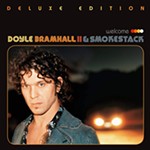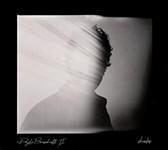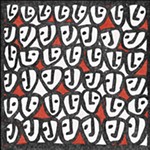The Rebirth of Doyle Bramhall II
For his first solo LP in 15 years, Eric Clapton’s top lieutenant may have put out the blues album of 2016
By Alejandra Ramirez, Fri., Nov. 18, 2016
Doyle Bramhall II stays busy. Slipping in and out of multiple modes – producer, singer, songwriter, sideman – the Dallas-born guitarist, 47, began his journeyman's path as a rhythm stringer for the Fabulous Thunderbirds at the age of 18. Soon thereafter, in 1992, he and Charlie Sexton took up the reins of the late Stevie Ray Vaughan's rhythm section, Double Trouble (bassist Tommy Shannon and drummer Chris Layton), and formed the Arc Angels, a hit act for Geffen Records.
That label affiliation helped kick-start Bramhall's solo career after the Austin supergroup imploded due in part to his heroin addiction. Doyle Bramhall II (1996) gave way to Jellycream (1999), which gained the attention of Eric Clapton. The ensuing collaboration between the two Strat masters, delayed briefly by Bramhall signing on as Roger Waters' touring ace around the millennium, touched off with the Texan joining the UK guitar god on Grammy-winning B.B. King vehicle Riding With the King in 2000 – an affiliation still as current as Clapton's Old Sock in 2013.
After the release of his third solo disc Welcome in 2001, Bramhall took a 15-year hiatus from self-promotion to work with a who's who of industry A-listers, everyone from Sheryl Crow to Erykah Badu. In 2011, his father died suddenly. Doyle Sr.'s musical résumé (revisit "Life by the Drop," Feb. 21, 2003) explains the breadth of his son's CV.
In the company of Paul Ray, Jimmie and Stevie Vaughan, Denny Freeman, and more, "Big Doyle" catalyzed the Austin blues scene in the mid-Seventies. The following decade segued him into the role of SRV's go-to songwriter and co-composer, Bramhall's name listed on Lone Star standards including "Change It," "The House Is Rockin'," and the Vaughan Brothers' "Long Way From Home." Like his father, DB II has proved his musicianship, but now stakes his claim as a modern blues great with Rich Man, which courses with his North African epiphanies in Morocco, Mali, and the Saharan Desert.
Austin Chronicle: Fifteen years is a long time between solo albums.
Doyle Bramhall II: Throughout the 15 years so much has happened. I'm a father now. It's great getting to see them grow, hanging out with them, taking them to the park and dropping them off at school. I've also kept busy by recording on people's records and getting hired to play or tour. Working with Eric Clapton, touring with him and helping him co-produce records, has given me so much experience. I've also just been living life and traveling to so many places like Africa. All the traveling made me go through the spiritual journey that is Rich Man.
AC: That journey's encapsulated in "New Faith." My favorite part is when the instruments drop out and you sing, "I wonder if we need a new faith to live by?" What is that new faith to you?
DB: When people are writing music, it's difficult mentioning politics and religion, right? We're really living in these trying times though. I'm in no way trying to disparage any faith that believes in peace, but from what I've observed, monotheism isn't working. There are many different people and cultures in the world, but there's no peace to overcome these problems. There's only focus on exclusion and what makes people different. We need a new way of thinking. There's no empathy or understanding to combat the unrest and suffering.
AC: You've said Welcome was only the first realization of your solo career. What about Rich Man?
DB: It's the death and the rebirth of myself. Rich Man is the butterfly phase that I'm in. In the few years before the album, I was caught in a real messy divorce [with Susannah Melvoin], and then my father died. During that time, I was feeling invisible. Even though I was working with Eric Clapton, Sheryl Crow, and so many people, I felt that way because I had a lot of suffering pent up inside that wasn't given a release. I wasn't able to fully express myself.
Through that suffering, I just sort of cracked and overloaded. It echoes that Leonard Cohen line: "The crack leads to light coming in." I wasn't being vulnerable and Rich Man begins in the aftermath of that suffering.
AC: There are a lot of new sounds with African and Indian roots on Rich Man.
DB: I grew up playing the blues, so I went back as far as I could with studying its origin from the Delta and Mississippi. When that lineage ended, I wanted to know where it all began and where that blues came to the U.S., so I went to Mali for about a month where I learned how the slaves came over. After that, I spent three weeks in Morocco and I took in all the music – Sufi music, and Moroccan music. It all just connected.
What I love about primal, Sufi, Mali, and Moroccan music is its purity. The blues is a lot like that too. It's so pure and visceral, like ripping your heart out. There's something so haunting about it because it comes from the heart. It's not done with the intention to pretty it up, to sell more records, or contrived by a record label.
AC: Did you consider the trip out of your comfort zone?
DB: Originally, yes. I was a bit worried because I only had one person that I was in contact with. She was the coordinator for [Malian singer] Salif Keita and helped me get started on my trip. When I started going into the interior of Mali, there was no language that I understood with anyone for about three weeks. I had to let go of my fear of the unknown, but I learned that if you trust yourself, it will lead you to the next event and you'll be fine. I kept meeting so many new people along the way and they would take me to the next village. Then I'd get on a boat, and go to the next place.
AC: The balance of rhythm throughout the album; did playing rhythm with the T-birds help with that?
DB: I dropped out of school at 15 because I was playing professionally. I was in northern California where I was playing with five different bands. Stevie came to town and was playing to a huge crowd. Backstage he asked me to sit in with him. It was nerve-wracking because he would introduce me as a great guitar player, sort of egging me on. Through Stevie, I got a hookup with Jimmie Vaughan and that's where the Fabulous Thunderbirds came in. Through that experience of working with so many different bands and playing rhythm for the Thunderbirds, it taught me how to be a team player. It helped me later with the Arc Angels, too. Even though I was the frontman, I had to share that with Charlie Sexton.
AC: How did you meet Charlie Sexton?
DB: I met him through my dad. He met Charlie on one of his trips to Austin. I think I was 14, and when he came back from the trip, he told me he met this musician that was new and a really cool kid. Charlie was 14 at that time, too, and he was already on tour opening for the Clash.
He was playing at a club in Fort Worth, so I remember walking in with this preppy outfit of a striped polo shirt and penny loafers. When I walk in and look at Charlie, he's in complete leather: leather pants, leather jacket, and combed-back hair.
I remember thinking, "Man, this sucks." Here I was dressed up as some nerdy, preppy guy and he looked like the coolest rocker I had ever seen. Years later, I saw him again in Australia while touring with the Fabulous Thunderbirds, and we talked about getting together back in Austin. Then came the Arc Angels.
AC: What has working with Clapton taught you?
DB: Working with Eric instilled me with confidence and belief in myself. It's okay to just be who I am and not worry about anything other than just playing my music and being confident in it. He showed me that just by the way he is in the studio and playing. He's not worried about what other people think about him. His personal endorsement means a lot to me, and it's funny because I always joke that if there's ever a moment I have doubts, I say, "Well, if Eric believes in me, I can believe in me too."
AC: His introduction to you came through your second solo album, Jellycream.
DB: At the time, I remember Clapton telling me his two favorite albums were D'Angelo's first record and my record. It just so happened that D'Angelo's record was my favorite as well.
AC: The new song "November" has that vibe, with its horns and strings. Was the R&B in that song intentional?
DB: I wasn't thinking of it stylistically in the beginning. Initially, I recorded it with Carla Azar [of Autolux] on drums and Sebastian Steinberg on bass as a threepiece. It reminded me of a Jimi Hendrix song called "Remember," that was his version of an old soul song. Mine kept getting bigger and the orchestration became more lush. The horn and strings' line really embody growing up with my father and listening to records with him. I wanted a horn line that captured that Sixties blaxploitation vibe of Curtis Mayfield.
AC: You and your father shared a love of R&B.
DB: Yeah, that was always on the record player when I was growing up. Some records on heavy rotation were of Sly & the Family Stone, Al Green, and Bobby Bland. Then my mom was listening to a lot of soul and funk like Graham Central Station. It's funny because with all the records that my dad put me on, I would always have a hard time listening to white-people music. I tried because my friends would like Eighties bands they encouraged me to listen to, but it never really cut it. I would always go back to those old soul records my dad and I would listen to.
AC: You mentioned somewhere that you lived at the clubs growing up?
DB: When my dad wasn't playing at the Armadillo or Antone's, it was a family thing for all of us to go see other bands like Fats Domino, Jimmie Vaughan, Freddie King, or whoever was in town. Someone would always hire someone locally to back them up. I remember going to the Armadillo a lot. When my mom and dad were out in the front listening, I would be playing in the kitchen and then eventually my sister and I would fall asleep. There was this place under the stage at the Armadillo that had padding so we'd go under the stage and fall asleep under the rumble of the music. We sometimes would literally live and sleep there.
It always felt like a close-knit scene with the Vaughans and the Bramhalls and a bunch of hippies together hanging out. It was family, and on a usual day we'd go to Barton Springs and swim during the day, and then play shows at night. Austin was so different than the hustle-bustle city it is today. The blues scene was my family. There wasn't many places like Austin where you could see Freddie King play at the Armadillo one day and on the same week or month maybe see Stevie Ray Vaughan play at Antone's.
AC: Did your dad nudge you toward playing an instrument?
DB: From what I told myself all these years was that I wanted to play guitar because nobody else in my family played the instrument. Being surrounded by musicians, I just had this innate ability when I picked it up. Even though my dad was supportive, he never really pushed or forced me into music. All we had was a bunch of drummers and one bass player, so it was more by default. Also, nobody listened to the music that we listened to. Everybody was listening to Duran Duran and Depeche Mode, while I was listening to Albert King, Little Johnny Taylor, and Bobby Bland.
I seemed to excel really quickly on the guitar, and only a year after playing it, I was starting to play professionally. Then oddly enough, at 17 I was playing with this one band but there was no singer. So, again, by default I tried it out. At first, I was very reluctant because I didn't want to be the focus. I just wanted to play my music.
AC: Even though you're a lefty, you play the guitar strung for a righty. And Stevie played with large-gauged strings. Did you and he ever talk guitar quirks?
DB: Yeah, at one point he used strings that were pretty massive. They started sounding like piano strings, because the tone on his first three albums was massive. He could play like that because he had just massive hands. Whenever you shook his hand, he would crush it. Not intentionally, of course, but his hands were that big. He was also that guy who would look you dead in the eye and give you a real brusque handshake. He was just that way in life, where he wanted to go out there and give it everything he had.
AC: You maintain that rhythm of yours on the new album via the Jimi Hendrix cover "Hear My Train A Comin'." You don't go off soloing like most would.
DB: That's what I like so much about Jimi, because he was not only a great guitar player, but a great songwriter and sonic innovator. Even without his otherworldly lead playing, he also had rhythm. It was mind-blowing how easily he could switch between the beautiful rhythmic chords but then go off on ridiculous soloing. He almost sung his melodies with the guitar and everything had a purpose.
AC: You were the one that introduced Gary Clark Jr. to Eric Clapton.
DB: Yes, I was. Eric was putting together the Crossroads concert for the third time and he will usually ask me about new artists. At the time I was already working with Gary, and I thought he was this amazing singer and guitar player. Eric then YouTubed him, and that Crossroads [Chicago 2010] was where he was seen by his record label. The rest is history.
AC: How's the future of Austin blues looking to you?
DB: The blues is being reinvigorated by a younger generation with players like Gary Clark Jr. and Tedeschi Trucks. It's giving new life to the blues. And Antone's will always keep the legacy of Austin blues alive, too.











